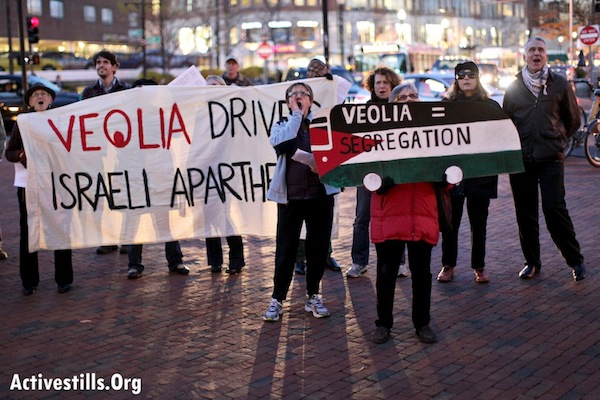The last paragraph of the UN Human Rights Council-sanctioned report on Israeli settlements may lay the legal and practical foundations for a new, untried regime of economic and trade sanctions against Israel, or at least provide new tools to those already advocating BDS.

The UNHRC-sanctioned International Fact Finding Mission’s report on Israeli settlements is by no means the harshest UN document on Israel. But its last paragraph introduces one element that previously existed only in small pro-Palestinian and human rights activist circles. Namely, it puts the “S” back in BDS.
The Boycott, Divestment and Sanctions campaign has had mixed, but limited, success since its official launch in its current iteration nearly seven years ago. Divestment and boycott campaigns have claimed small victories after targeting educational and labor pension investment funds, transportation companies serving Israelis in the occupied Palestinian territories, academic conferences and musical and cultural events. But many “big-picture” observers will admit that its successes have led to little if any change in Israeli policy, and subsequently, in the Palestinian reality.
While former international officials have called for limited sanctions against Israel should it fail to cease its settlement enterprise, and current officials have hinted at limited travel sanctions against violent settlers, the notion of sanctions against Israel has largely taken a back seat to the more constricted and arguably less impactful boycott and divestment campaigns.
Last week’s UN report, however, advanced the prospects of – and possibly laid the beginnings of a legal groundwork for – economic sanctions against Israel for its continued settlement enterprise, which is viewed as illegal under international law in every corner of the globe.
The last paragraph of the report’s recommendations reads (emphasis added):
Private companies must assess the human rights impact of their activities and take all necessary steps – including by terminating their business interests in the settlements – to ensure they are not adversely impacting the human rights of the Palestinian People in conformity with international law as well as the Guiding Principles on Business and Human Rights. The Mission calls upon all Member States to take appropriate measures to ensure that business enterprises domiciled in their territory and/or under their jurisdiction, including those owned or controlled by them, that conduct activities in or related to the settlements respect human rights throughout their operations.
If and when the UN report is finalized and adopted by the UNHRC and then the UN General Assembly (GA), the first possible legal – but more significantly, practical – foundations for sanctions will have been laid.
General Assembly resolutions do not carry the legally binding and obligatory weight of Security Council resolutions, and any likely GA measure will merely call on the Security Council to implement its recommendations. Furthermore, it would not be the first time the General Assembly passed a resolution calling for sanctions against Israel. But the Security Council never adopted those resolutions (UNGA Resolution 3414 and UNGA Resolution 31/61), primarily because they were blocked by Washington’s perennially loyal veto. There is no reason to believe the United States will act any differently in the future.
But there is something about those previous resolutions of great relevance: Resolutions 3414 and 31/61 called for an end to military and economic aid to Israel, which is provided almost exclusively by the United States.
Any future resolution based on the UNHRC report could – explicitly or implicitly – call on states to take measures to regulate private businesses that operate in settlements in the Palestinian territories, in line with the report’s recommendations.
By addressing private business and economic interests instead of state-to-state aid, such a resolution would be actionable – regardless of legal obligation – by a much larger number of countries whose citizens do business in Israel, and many times by natural extension, in the settlements.
This is not to say that the UN report or its possible adoption by the General Assembly will inevitably lead to sanctions against Israel, or in a more limited sense, against its settlement activities. Even if such momentum were to transpire, the near-consensus requirement of EU trade policy (Israel’s largest trade partner) makes radical and sweeping economic sanctions all the less likely.
But in a time when the BDS movement is gaining momentum, putting the onus of action against Israeli settlement and human rights violations on states – instead of private student and ecumenical groups – holds the potential to ratchet up pressure to levels unseen since the Arab Oil Boycott. Furthermore, and perhaps most consequently, it could serve as an important tool to those calling for BDS-inspired actions and campaigns against Israel.
Without addressing the legitimacy of sanctions in general, or the ability of BDS-type campaigns to end Israeli settlement, the occupation and human and civil rights abuses against Palestinians, the final two sentences of the UN report could be the start of a diplomatic and economic regime of pressure against Israel. If that takes place, it might force Israel to begin reconciling itself with the consequences of its actions, and more tangibly, reconsidering the policy decisions that put it at odds with much of the world.
Related:
UN Human Rights Council: Settlement issue could end up in the International Criminal Court

